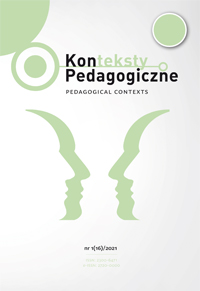Abstrakt
Autor artykułu wyjaśnia znaczenie terminu „dys¬kryminacja”, odwołując się przede wszystkim do przepisów prawa, w tym do Konstytucji RP. Według art. 32 ust. 2 tego najważniejszego krajowego aktu prawnego nikt nie może być dyskryminowany w jakimkolwiek obszarze życia (publicznym, społecznym lub gospodarczym) z jakiejkolwiek przyczyny, po¬nieważ – jak zapisano z kolei w art. 30 ust. 1 – wszyscy są równi wobec prawa. Źródłem owej równości jest – co również podkreślono w Konstytucji RP (art. 30) – przyrodzona, niezby¬walna i nienaruszalna godność każdego człowieka. Owa god¬ność jest niezależna od jakichkolwiek cech, w tym najgłębszej nawet niepełnosprawności. Tak rozumiana godność traktowana jest w wielu dokumentach prawnych o międzynarodowym za¬sięgu jako etyczna przesłanka praw i wolności osób z niepełno¬sprawnością. Podobny status zajmuje w Konwencji o prawach osób niepełnosprawnych Organizacji Narodów Zjednoczo¬nych ratyfikowanej przez Polskę w 2012 roku. Od momentu ratyfikacji dokument ten jest elementem krajowego porządku prawnego, a zatem reguluje również kwestie równego trakto¬wania osób z niepełnosprawnością. Czy zawarte w nim regula-cje wpływają na rzeczywistą sytuację tej grupy osób odnośnie do dyskryminacji? Odpowiedzi dostarczają przytoczone przez autora wyniki badań.
Bibliografia
Czym jest dyskryminacja? (2014). Biuletyn Informacji Publicznej RPO, https://www.rpo. gov.pl/pl/content/czym-jest-dyskryminacja [dostęp: 1.03.2021].
Dyduch, E. i Mikrut, A. (2019). Przygotowanie do zawodu i zatrudnienia osób z niepełnosprawnością intelektualną. Rozważanie na kanwie Konwencji o prawach osób niepełnosprawnych. Kraków: Wydawnictwo Naukowe Uniwersytetu Pedagogicznego.
Dykcik, W. (1997). Wprowadzenie w przedmiot pedagogiki specjalnej jako nauki. W: W. Dykcik (red.), Pedagogika specjalna (s. 13– 59). Poznań: Wydawnictwo Naukowe UAM.
Hulek, A. (1980). Integracyjny system kształcenia i wychowania. W: A. Hulek (red.), Pedagogika rewalidacyjna (s. 492–506). Warszawa: PWN.
Jankowska, M. (2011/2012). Prawa osób niepełnosprawnych w międzynarodowych aktach prawnych. Niepełnosprawność – Zagadnienia, Problemy, Rozwiązania, 1(1), 24–45.
Kantar Public (2018). Świadomość prawna w kontekście równego traktowania 2018. Raport dla Biura Rzecznika Praw Obywatelskich, https://www.rpo.gov.pl/sites/default/ files/Badania%20Kantar%20Public%20dla%20RPO%20o%20postrzeganiu%20 dyskryminacji%20przez%20Polakow%20w%202018%20r.pdf [dostęp: 2.04.2021].
Kosakowski, C. (2003). Węzłowe problemy pedagogiki specjalnej. Toruń: Wydawnictwo Edukacyjne Akapit.
List of issues in relation to the initial report of Poland, CRPD/C/POL.Q/1 (2018). Committee on the Rights of Persons with Disabilitie, https://www.rpo.gov.pl/sites/default/ files/List of issus (jęz. ang.).docx [dostęp: 6.04.2021].
Mazurek, F.J. (2001). Godność osoby ludzkiej podstawą praw człowieka. Lublin: Redakcja Wydawnictw KUL.
Mikrut, A. (2010). O integracji społecznej osób z niepełnosprawnością w kontekście podmiotowości człowieka. Niepełnosprawność, 4, 122–134.
Mikrut, A. (2013). O prawie osób z niepełnosprawnością intelektualną do przeżywania i wyrażania swojej seksualności. Między ideą, deklaracjami a rzeczywistością. Niepełnosprawność, 9, 57–71.
Mikrut, A. (2017). O etycznych przesłankach popierania, ochrony i urzeczywistniania prawa osób z niepełnosprawnością do partycypacji społecznej. Człowiek – Niepełnosprawność – Społeczeństwo, 3(37), 77–93.
Mrugalska, K. (2008). Wstęp. W: A. Waszkielewicz (red.), Polska droga do Konwencji o prawach osób niepełnosprawnych ONZ (s. 6–7). Kraków: Fundacja Instytutu Rozwoju Regionalnego.
Pawłowski, P. (2007). Świat dla wszystkich. W: Konwencja Praw Osób Niepełnosprawnych Organizacji Narodów Zjednoczonych, tłum. R. Bobrowicz (s. 2–3). Warszawa: Stowarzyszenie Przyjaciół Integracji.
Radziejowska, M. i Mazurczak, A. (2013). Konwencja o prawach osób niepełnosprawnych. Poradnik RPO. Warszawa: Biuro Rzecznika Praw Obywatelskich.
Realizacja przez Polskę zobowiązań wynikających z Konwencji o prawach osób niepełnosprawnych. Sprawozdanie Rzecznika Praw Obywatelskich 2012–2014 (2015). Warszawa: Biuro Rzecznika Praw Obywatelskich, https://bip.brpo.gov.pl/sites/default/ files/Sprawozdanie%20KPON%202015.pdf [dostęp: 27.03.2021].
Słownik języka polskiego PWN (1978). Warszawa: PWN.
Słowniku wyrazów obcych PWN (1980). Warszawa: PWN.
Speck, O. (2005). Niepełnosprawni w społeczeństwie. Podstawy ortopedagogiki, tłum. W. Zeidler. Gdańsk: Gdańskie Wydawnictwo Psychologiczne.
Sprawozdanie przedstawione przez Rząd Rzeczypospolitej Polskiej zgodnie z postanowieniami artykułu 35 Konwencji o prawach osób niepełnosprawnych z działań podjętych w celu wprowadzenia w życie jej postanowień (2014), http://www.niepelnosprawni. gov.pl/aktualnosci/art400.pierwsze-sprawozdanie-dla-onz.html [dostęp: 10.05.2018].
Standardowe Zasady Wyrównywania Szans Osób Niepełnosprawnych (1993), http://www. tus.org.pl/uploads/dokumenty/standardowe_zasady_wyrownywania_szans_osob_niepelnosprawnych.pdf. [dostęp: 18.03.2021].
Stobart, G. (2000). Czy psychologia potrafi uzasadnić ideę integracji dzieci o specjalnych potrzebach? W: G. Fairbairn, S. Fairbairn (red.), Integracja dzieci o specjalnych potrzebach. Wybrane zagadnienia etyczne, tłum. A. Fus i W. Tabisz (s. 49–63). Warszawa: Centrum Metodyczne Pomocy Psychologiczno-Pedagogicznej MEN.
Szczerba-Zawada, A., Kuruś, M., Domaradzka-Widła, A. i Widła-Domaradzki, Ł. (2020). Ochrona przed dyskryminacją w Polsce. Stan prawny i świadomość społeczna. Wnioski i rekomendacje RPO. Warszawa: Biuro Rzecznika Praw Obywatelskich, https:// bip.brpo.gov.pl/sites/default/files/Ochrona_przed-_dyskryminacja_w_Polsce.pdf [dostęp: 2.04.2021].
Autor zgodnie z zaleceniem MNiSW, by przeciwdziałać praktykom „ghostwriting” i „guest authorship” składając tekst dołącza oświadczenie Autora/Autorów, w którym deklaruje wkład każdego z Autorów w powstawanie publikacji. Własnoręcznie podpisane oświadczenie należy przesłać na adres redakcji:
Joanna Skibska | w formie skanu przesłać poprzez system OJS (biblioteka wydawcy).
Autorzy nie ponoszą żadnych kosztów w związku z publikacją artykułu na łamach czasopisma Konteksty Pedagogiczne oraz nie otrzymują gratyfikacji finansowej za opublikowanie tekstu. Redakcja zastrzega sobie prawo do wprowadzania niewielkich zmian w artykułach, które nie mają wpływu na merytoryczną stronę publikacji.
Autor (Autorzy) artykułu oświadcza, że przesłane opracowanie nie narusza praw autorskich osób trzecich. Wyraża zgodę na poddanie artykułu procedurze recenzji oraz dokonanie zmian redakcyjnych. Przenosi nieodpłatnie na Wydawnictwo Libron autorskie prawa majątkowe do utworu na polach eksploatacji wymienionych w art. 50 Ustawy z dnia 4 lutego 1994 r. o prawie autorskim i prawach pokrewnych – pod warunkiem, że praca została zaakceptowana do publikacji i opublikowana.
Wydawnictwo Libron posiada autorskie prawa majątkowe do wszystkich treści czasopisma. Zamieszczenie tekstu artykuły w repozytorium, na stronie domowej autora lub na innej stronie jest dozwolone o ile nie wiąże się z pozyskiwaniem korzyści majątkowych, a tekst wyposażony będzie w informacje źródłowe (w tym również tytuł, rok, numer i adres internetowy czasopisma).
Tekst jest udostępniany w internecie na licencji CC-BY-SA

